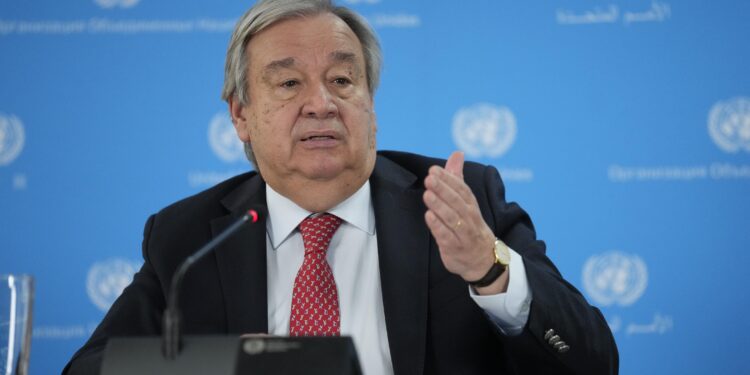UNITED NATIONS, May 24 (APP): The world is failing to live up to its commitment to protect civilians during wartime, United Nations Secretary-General Antonio Guterres told the UN Security Council on Tuesday, urging greater respect for international humanitarian law.
The UN chief was speaking during a debate on ensuring the security and dignity of people caught in the crossfire and addressing the related issue of access to food and essential services.
“Civilians have suffered the deadly effects of armed conflict for too long. It is time we live up to our promise to protect them,” said Guterres, who also called for action “to break the deadly cycle of armed conflict and hunger”.
Last year, civilians accounted for 94 percent of victims of explosive weapons deployed in populated areas, he said.
More than 117 million people worldwide also faced acute hunger in 2022, primarily because of war and insecurity, which he described as “an outrage”.
The secretary-general pointed to recent action towards alleviating the impact of conflict on civilians. For example, some warring parties have taken steps to protect children and allow humanitarians to access people in need.
Addressing food security, he mentioned measures such as the Black Sea Initiative to export grain from Ukraine amid the ongoing war, as well as a Memorandum of Understanding on bringing Russian food and fertilizer to global markets.
Last November, states adopted a political declaration on restricting or refraining from the use of explosive weapons in populated areas, which he urged all countries to join.
The Council also adopted a resolution the following month which aims to prevent UN sanctions from harming civilians and obstructing humanitarian action.
“These modest steps are welcome. But the terrible truth is that the world is failing to live up to its commitments to protect civilians; commitments enshrined in international humanitarian law,” said Guterres, referring to the Geneva Conventions.
“We need action and accountability to ensure it is respected. That depends on political will,” he added.
The Secretary-General urged the international community to intensify efforts to prevent conflict, protect civilians, preserve peace and find political solutions to war.
“Where war continues, all countries must comply with international humanitarian law and members of this Council have a particular responsibility,” he said.
He urged Governments to incorporate international humanitarian law into their own laws, and military rules and training, adding that humanitarians also must be assured safe access and attacks against them must cease.
The Council has a special role to play in urging States to respect the rules of war, he said. Governments with influence over warring parties should engage in political dialogue, and train forces on better protecting civilians.
Additionally, countries that export weapons should refuse to do business with any party that fails to comply with international humanitarian law.
Furthermore, those who commit war crimes must be held to account. “States must investigate alleged war crimes, prosecute perpetrators and enhance other States’ capacity to do so,” he said.
In his remarks, the Secretary-General paid tribute to the work of the International Committee of the Red Cross (ICRC), the “guardians” of the Geneva Conventions.
ICRC President Mirjana Spoljaric, who also briefed the Council, reported that non-international armed conflicts have more than tripled over the past two decades – from less than 30 to over 90.
She issued an urgent call to protect civilians and critical infrastructure in urban areas.
“As fighting envelops towns and cities, such as in Sudan, Syria, Ukraine and Yemen, the ICRC is seeing large-scale and compounding patterns of harm. We need to break the pattern of violations, and this can be done through strong political will and sustained action” she said.
Ms. Spoljaric also spoke of the threat posed by misinformation and disinformation during the conflict, which can fuel dangerous community divisions and undermine humanitarian action.
She also underscored that civilian protection covers everyone, regardless of gender.
In this regard, ICRC recommendations include ensuring that the clear prohibition of sexual violence under international humanitarian law is integrated into national laws, military doctrine and training.
Civil society representative Aichatou Mounkaila from Niger delivered a message to the Council on behalf of women in the Lake Chad Basin region in Africa, where attacks by Boko Haram insurgents and other armed groups have displaced millions.
Speaking in French, she said women are the first victims of any crisis but they also are the first to provide solutions.
Ms. Mounkaila outlined five points that could inform the Council’s approach to ending conflict and hunger. Action includes encouraging donors to allocate more funding to gender-sensitive livelihood reconstruction in areas such as sustainable agriculture, where women play a central role, so that they can rebuild their lives and communities.
She also urged the Council to insist on the full, equal, and meaningful participation and leadership of women and girls at all levels of humanitarian response, community dialogues, peacebuilding and peace negotiations.
“Without women, no sustainable peace is possible,” she added.




















